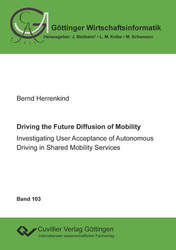| Departments | |
|---|---|
| Book Series (96) |
1379
|
| Nachhaltigkeit |
3
|
| Gesundheitswesen |
1
|
| Humanities |
2367
|
| Medienwissenschaften | 16 |
| Theology | 57 |
| Philosophy | 102 |
| Law | 422 |
| Economics | 851 |
| Social sciences | 416 |
| Sports science | 48 |
| Psychology | 233 |
| Educational science | 190 |
| History | 183 |
| Art | 111 |
| Cultural studies | 166 |
| Literary studies | 117 |
| Linguistics | 88 |
| Natural Sciences |
5407
|
| Engineering |
1793
|
| Common |
98
|
|
Leitlinien Unfallchirurgie
5. Auflage bestellen |
|
Advanced Search
Driving the Future Diffusion of Mobility (Volume 103) (English shop)
Investigating User Acceptance of Autonomous Driving in Shared Mobility Services
Bernd Herrenkind (Author)Preview
Table of Contents, PDF (740 KB)
Extract, PDF (830 KB)
The influence of technology on society is fundamental in its overall makeup and creation that
it is almost impossible to imagine the world without it. Technological developments have
certainly shaped opportunities and advantages for various people. Considering a life without
technology would be a challenging thought for many people because technology perpetually
influences and changes lives. Specifically, in the field of mobility, technological progress and
digitalization lead to new possibilities. Mobility can be rethought, and new forms of mobility
and business models can emerge. Building up knowledge about the acceptance factors on
which these new forms of mobility depend from the user’s point of view may contribute to
enabling their (future) introduction and establishment. This cumulative thesis aims to contribute
to research on the topic of acceptance concerning autonomous shared mobility services
and to provide important and useful stimuli for application in businesses.
| ISBN-13 (Hard Copy) | 9783736972148 |
| ISBN-13 (eBook) | 9783736962149 |
| Final Book Format | A5 |
| Language | English |
| Page Number | 266 |
| Lamination of Cover | glossy |
| Edition | 1. |
| Book Series | Göttinger Wirtschaftsinformatik |
| Volume | 103 |
| Publication Place | Göttingen |
| Place of Dissertation | Göttingen |
| Publication Date | 2020-05-25 |
| General Categorization | Dissertation |
| Departments |
Economics
Economic and social policy Business economics Statistics and operations research, business mathematics Empirical social research |
| Keywords | Autonomous Driving, Digital Shared Mobility Services,Technology Acceptance Model,Digital Shared Mobility Services in IS Research,Digital Shared Mobility Services,Acceptance of Autonomous Driving,General End-User Acceptance Factors of Autonomous Driving,Shared Mobility Meets Autonomous Driving,End-User Acceptance of Autonomous Electric Buses,Life Circumstances and Age-Related Differences on the Acceptance,Autonomous Driving,Alternative Fuel Vehicle,Autonomous Vehicle,Sharing Economy,Self-Driving Public Bus,Information Systems,Society of Automotive Engineers, Shared Mobility Services, Sharing Economy, Information Systems, Literature Analysis, Research Agenda, Autonomous Driving, User Acceptance, Technology Acceptance Model, Alternative Fuel Vehicles, Autonomous Electric Buses, Sustainable Mobility, Young Travel Behavior, Life-oriented approach, acceptance research |








